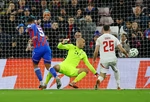Russian UN Representative: Resolution on Srebrenica Genocide Threatens Peace and Security

Russia’s permanent representative to the UN, Vasily Alekseyevich Nebenzya, stated during today's UN General Assembly session that the adoption of the Resolution on the Srebrenica Genocide aims to disrupt peace and security rather than promote reconciliation.
Oglas
"Before the vote, you addressed the representative of Serbia. Let me remind you that he is not just a representative but the President of Serbia, and he should be addressed with respect," Nebenzya began.
He described the session as a "sad chapter" in the General Assembly's history, accusing Germany and other nations of using their influence to pass the Resolution under the guise of remembrance while aiming to demonize a specific ethnic group in the Balkans.
Nebenzya criticized the Resolution for not calling for the implementation of the Dayton Agreement, which is crucial for peace in Bosnia and Herzegovina. He noted that many UN member states did not support the Resolution, arguing it undermines the authority of a nation's Presidency and was adopted without sufficient backing.
“The sponsors misled the General Assembly, claiming this would lead to reconciliation. The very discussion of the draft has already increased regional tensions. Drawing parallels between this Resolution and the Rwandan genocide is inappropriate,” Nebenzya argued.
He added that the final draft was presented to the Assembly on a "take it or leave it" basis, disregarding efforts by responsible UN members, including Russia and Serbia, to foster a unified regional stance.
“Netherland even dared to join in, despite its battalion's role in the Srebrenica events of 1995,” he remarked.
Concluding, Nebenzya accused Germany, the main sponsor of the Resolution, of hypocrisy given its history of starting two world wars and committing atrocities in concentration camps. He argued that the UN was established in response to Nazi crimes, thus Germany should focus on its historical wrongdoings rather than lecturing others on reconciliation.
Kakvo je tvoje mišljenje o ovome?
Učestvuj u diskusiji ili pročitaj komentare
Oglas
Kakvo je tvoje mišljenje o ovome?
Učestvuj u diskusiji ili pročitaj komentare
Oglas





 Srbija
Srbija
 Hrvatska
Hrvatska
 Slovenija
Slovenija



























































